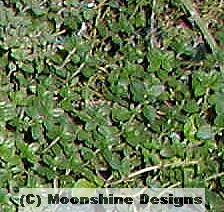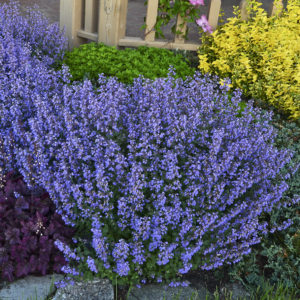
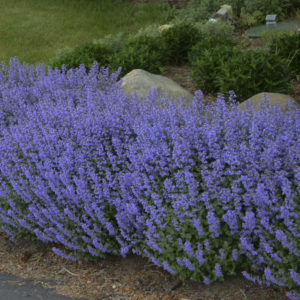
Catmint, ‘Purrsian Blue’ PP24788
Photos courtesy of Walters Gardens, Inc.
Nepeta faassenii ‘Purrsian Blue’ PP24788
Common Name: Catmint,
Like ‘Cat’s Meow’, this selection shares an improved tidy habit, though it is a bit smaller and more compact in size overall. In its first year, ‘Purrsian Blue’ forms a small, perfectly rounded, densely branched clump of tiny, green leaves. In year two, the plant maintains its compact mounding habit but nearly doubles its spread to just over two feet across.
This is a very floriferous selection whose flower power is amplified by its having its flowers spaced closely together on the stems. Periwinkle blue flowers are coddled by dark purple calyxes just above the aromatic foliage from early summer into early fall.
‘Purrisan Blue’ has everything today’s gardeners are looking for: a low maintenance, drought tolerant, deer resistant, long blooming perennial that looks great all season.
When Nepeta’s stems are broken, they release an aroma into the air that tends to attract cats, thus its common name, Catmint.
Height: 14.0-18.0 Inches
Spread: 18.0-30.0 Inches
Hardiness Zones: 3,4,5,6,7,8
Flower Color: Purple-blue shades
Foliage Color: Green shades
Sunlight: Full Sun (> 6 hrs. Direct Sun)
Water Requirements: Low Water Needs Average Water Needs
Soil Quality: Poor Soil Quality Average Soil Quality
Soil Chemistry: Neutral Soil (pH = 7.0)Alkaline Soil (pH > 7.0)
Bloomtime: Early Summer, Midsummer, Late Summer, Early Fall. Long Blooming
Attracts Wings: Attracts Butterflies, Hummingbirds, Bee Friendly
Critter Resistant: Deer Resistant Rabbit Resistant
Growth Rate: Medium
Grown and shipped in 3-1/2″ Perennial Pots.
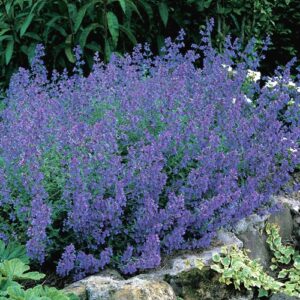
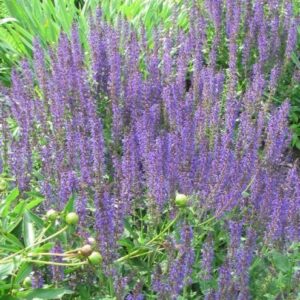
Catmint, Blue Carpet
In late spring, plants produce 6-8 inch flowering spikes with an abundance of 2-lipped, tubular lavender-blue flowers over an extended time making this plant a useful addition to the sunny border. The small crinkly green-grey leaves are short growing, aromatic and lightly toothed.
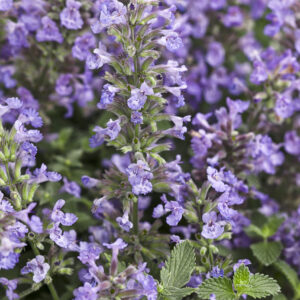
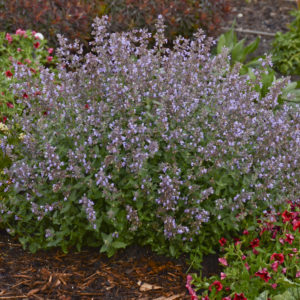
Catmint, Cat’s Meow PPAF CPBRAF
Truly the “cat’s meow”, the best Catmint we’ve seen yet! Unlike most Nepetas that have a bit of a wild, unkempt look, this first class selection keeps its tidy, dense, rounded shape all season long.
Its small, grey-green, aromatic leaves are topped with well-branched stems carrying spikes of sky blue flowers with purple calyxes from early summer into early fall.
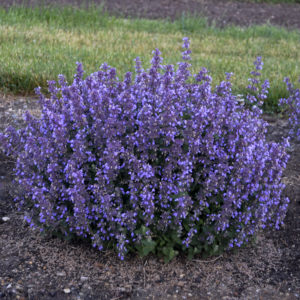
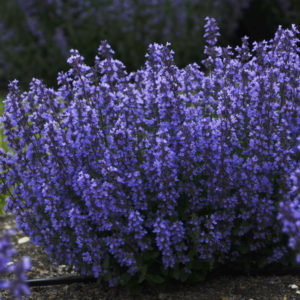
Catmint, Cat’s Pajamas USPPAF, PBRAF
A long blooming perennial that’s perfect in small areas of the landscape. Indigo blue flowers are produced all the way from the soil to the tips, providing an intense splash of color when it’s in bloom
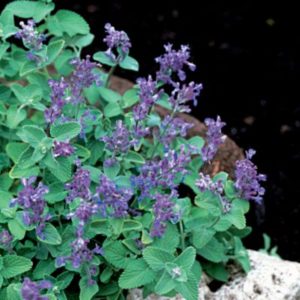

Catmint, Felix
12” tall mounding to 24” wide, compact, highly branched growth…3-4” flower spikes of lavender blue blooms all summer. Shearing after the first bloom speeds the process. Full sun, well drained soils are best, pots, rock garden…deer resistant. Great bee plant!
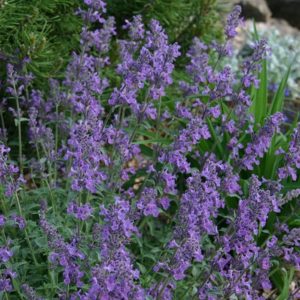
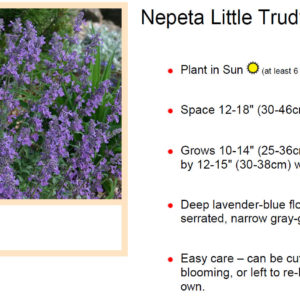
Catmint, Little Trudy®
Scientific Name: Nepeta x faassenii
Common Name: Catmint
Hardiness Zone: 4a – 9b
Hardiness Degree: -30°F (-34.4°C)
Blooming Season: Spring, Late Spring, Summer, Late Summer, Autumn
Plant Habit: Mounded
Characteristics: Rabbit Resistant, Colorful/Attractive Foliage, Scented Foliage, Heat Tolerant, Low Maintenance, Frost Tolerant, Deer Resistant, Drought Tolerant, Attracts Bees, Attracts Butterflies
Water: Light
Fertilize: None or when needed only
Spacing: 12 – 18″ (30 – 46cm)
Height: 10 – 14″ (25 – 36cm)
Width: 12 – 15″ (30 – 38cm)
Exposure: Sun
General Information: Deep lavender-blue flowers and serrated, narrow gray-green leaves.
Grower Information:
Deep lavender-blue flowers and serrated, narrow, gray-green leaves.
‘Psfike’
Protection Information: PP18,904
LITTLE TRUDY is a U.S. registered trademark of Plant Select.
Grown and shipped in 3-1/2″ Perennial Pots.
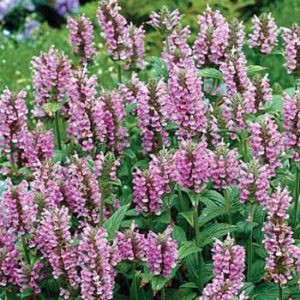

Catmint, Pink Cat
Pink Cat is an early blooming and mounding variety of Catmint that is not commonly found. This type is somewhat shorter and bushier that common Catmint. It forms fragrant pink spikes that will attract hummingbirds, butterflies and bees.
Pink Cat works well in containers as well as in your perennial border. Compact, heat tolerant, and easy to grow with aromatic leaves.
Use as a great general ground cover, accent plant, pathway edger, or rock garden specimen. (not for foot traffic)
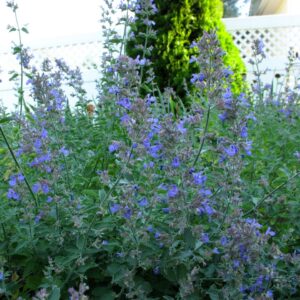

Catmint, Walker’s Low
Deep lavender-blue flowers and it is one of the most vividly colored catmints. Blooms from June to September.
Soft, crinkled, gray-green leaves on a short, mounding plant.
Good in containers, for borders, and the perennial herb garden. Very good choice for a tough, perennial ground cover!
Contains nepetalactone, the active ingredient in catnip that drives cats nuts..
Medicinal: In tea for nervous tension, sleeplessness. Catmint tea will put you to sleep in short order. Do not take this if operating a car or machinery!
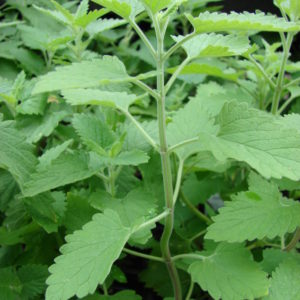
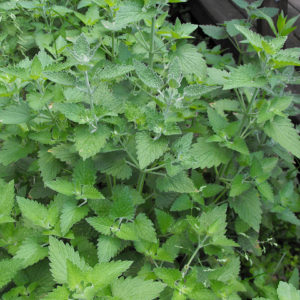
Catnip-Nepeta cataria
Catnip has a well earned reputation for sending cats into states euphoria. Catnip, a member of the mint family, is a harmless “high” for felines. Although many cats will eat it, scientists say they’re reacting to the smell rather than the taste. Felines bite, chew, rub against, and roll in catnip to release the volatile oil trapped in the leaves. About 80% of adult cats react to this irresistible, intoxicating, analgesic soporific. The tendency to like or ignore catnip is inherited, and it’s true that some cats are immune to its influence.
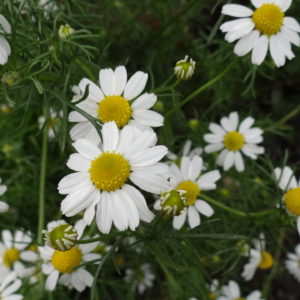
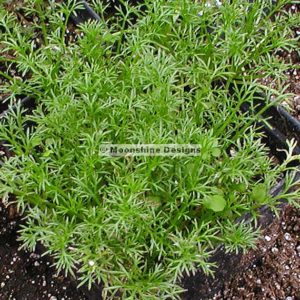
Chamomile, Roman
Chamomile has been taken for centuries as a digestive tonic. It reduces inflammation, stimulates the appetite and aids insomnia. Acts as a diuretic and nerve tonic. Helpful for colitis, diverticulosis, fever, headaches and pain. Good for menstrual cramps. Useful as a mouthwash for minor mouth and gum infections.
This perennial form is also known as Roman chamomile. Excellent groundcover since it grows only 4 to 12 inches in height. The feathery foliage has an apple scent. Blooms are white, daisy-like flowers with down-turned petals.
Roman chamomile foliage can be chopped and stirred into butter or sour cream that is used to top baked potatoes.
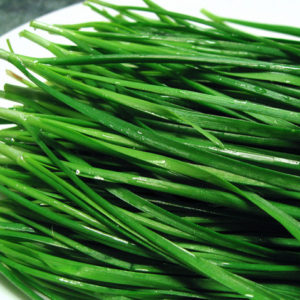

Chives, Onion and Garlic
The subtle and pleasant taste of chives make them an extremely popular food addition! Fresh chives, finely chopped, are sprinkled over soups, baked potatoes, stews, and several sauces. In mid-Summer, they will also put on quite a show with their abundant, fragrant flowers. Certainly just as well at home in the flower garden as the herb garden. Perfect year around windowsill plant, too!
In Chinese cooking, the flat leaves of garlic chives are often used the same way as we use regular chives in our cooking:., sprinkled over foods for extra fragrance and decoration. Garlic chives can be substituted by regular chives, but since regular chives have a weaker flavor, it is worthwhile to grow both so you will always have an ample supply of either one for what ever the recipe calls for.
Onion flavor chives have round leaves. Garlic flavor have flat leaves.
Available separate, or as a collection
Full sun
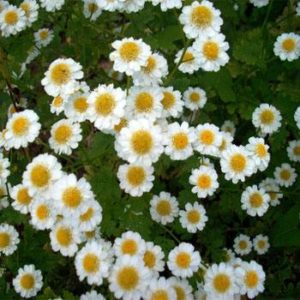

Feverfew
Feverfew is an herb. The leaves are used by herbalists to make medicine. It is also a very ornamental perennial.
Feverfew has many uses, including preventing migraine headaches in some people.
Feverfew is also said to be effective for fever, irregular menstrual periods, arthritis, a skin disorder called psoriasis, allergies, asthma, ringing in the ears (tinnitus), dizziness, and nausea and vomiting.
Some people use feverfew for difficulty getting pregnant or fathering a child (infertility). It is also used for “tired blood” (anemia), cancer, common cold, earache, liver disease, prevention of miscarriage, muscular tension, bone disorders, swollen feet, diarrhea, upset stomach and intestinal gas. Feverfew is sometimes applied directly to the gums for toothaches or to the skin to kill germs.

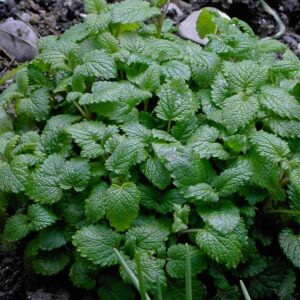
Lemon Balm
Sweet lemon-mint scent! Easy to grow in moist, well-drained fertile soil. Prefers full sun. Mature height: 18-26″. Space 12″.
Perennial herb Zones 4-9. A protective mulch is suggested where winter temps drop below 0
Use the fresh leaves for tea and salads.
Traditional medicinal uses: Foliage used for colds, flu, depression, headache, indigestion. Sedative. Antiviral.
15-30 days to harvest from potted plants.
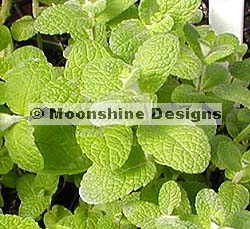
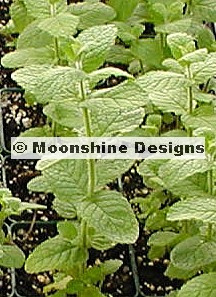
Mint, Apple
This hardy perennial is a very robust grower. Apple Mint has interesting light green leaves. They are somewhat hairy on the upper surface and downy underneath, with serrated edges. They can grow up to 3 feet high, but may be kept lower.
Grow Apple Mint in full sun to light shade. Feed them heavily in late summer to guarantee healthy growth the following spring. Apple Mint will survive in dry soil, but will do much better in moist, fertile ground. Cut back or mow down the Mint patch 2 or 3 times a year to encourage fresh growth. Cut the stems even with the ground and throw out the long, woody stems. Strip off and dry whole leaves for potpourris. Save the top 2 to 3 sets of leaves for fresh use and garnishes. Apple Mint’s fragrance may vary in strength; the mild apple flavor doesn’t sustain well in dried leaves.
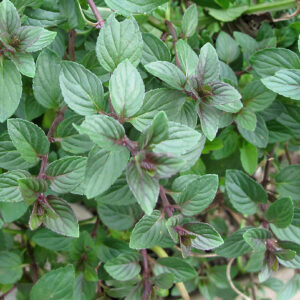

Mint, Chocolate
Tastes like a Peppermint Patty. Distinct hint of chocolate flavor and aroma. If you are a coffee lover, place a sprig in the bottom of your mug and pour hot coffee over it and let steep for a few minutes. Great stuff! Or try using it finely chopped and added to chocolate sauces, frostings, or ice creams for a refreshing minty flavor.
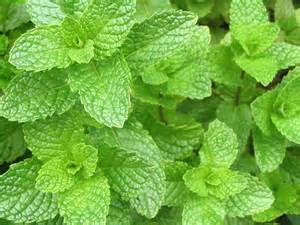
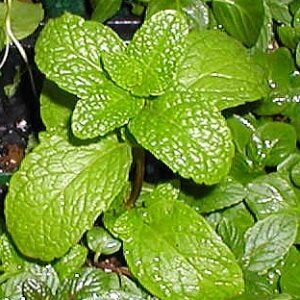
Mint, Kentucky Colonel Spearmint
THE MOJITO MINT! Commercially grown for Mint Juleps, Mojitos, and spearmint flavoring. Large, dark green, slightly crinkly leaves. Kentucky Colonel is a reliably hardy, strongly flavored spearmint that is favored by many herb growers. OUR MOST POPULAR MINT!
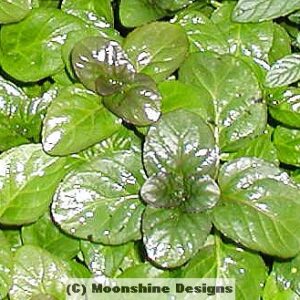
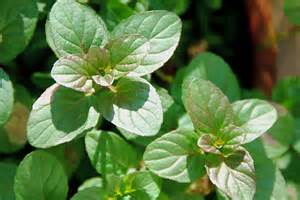
Mint, Orange
Also called Eau de Cologne mint, similar to the bergamot orange used to flavor Earl Grey tea. It makes a wonderful addition to iced tea, fruit desserts, and pot pourris.
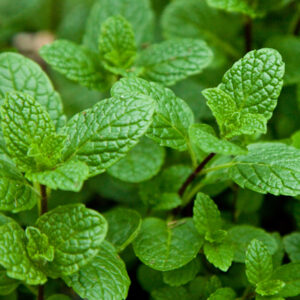
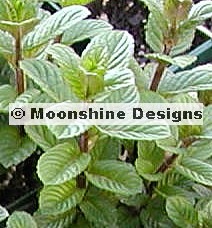
Mint, Spearmint
Classic Spearmint
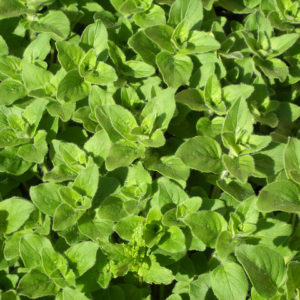
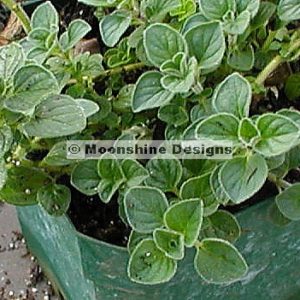
Oregano, Greek-Hot & Spicy
Tiny, dark green leaves with white flowers. Spicy-oregano zest! Reliable perennial herb.
Immediate use from potted plants.
Best in full sun. mature height: 8-24″. Spacing: 12″. Perennial Zones 4-9.
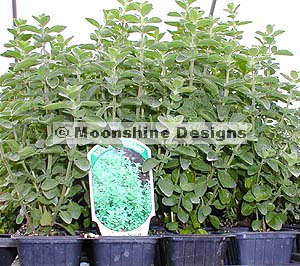

Oregano, Sicilian
True perennial Italian Sicilian oregano. Nice oregano aroma; great for pizza and Italian cooking. Dark green leaves with white flowers. Traditional medicinal uses: In tea for indigestion. Easy to start from seed. Reliable perennial herb.
80-90 days to harvest when started indoors from seed. Immediate use from potted plants.
Best in full sun. mature height: 8-24″. Spacing: 12″. Perennial Zones 4-9.
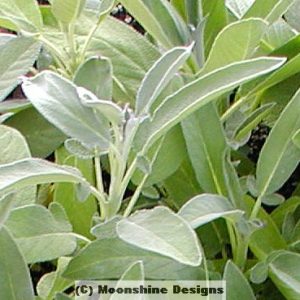

Sage, Garden
Hardy perennial.
Zones 5-9
Sun to Part Shade.
16-30″ height. Space 12″-18″.
Edible leaves and flowers: garnish, cook in rice, egg or cheese dishes. Classic herb for stuffing.
Tough and hardy perennial herb.
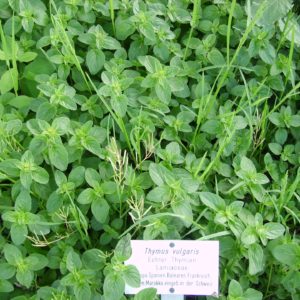
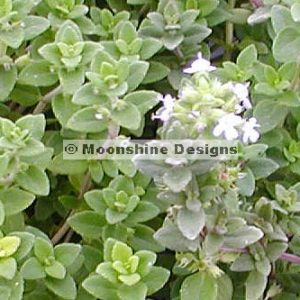
Thyme, English
No herb garden is complete without English thyme! One of the hardier Thymes, these highly fragrant plants will produce large quantities of aromatic, tiny leaves that can be used either fresh or dried.
Zones 5-10. Zone 4 with protection.
Tough and hardy perennial herb.

